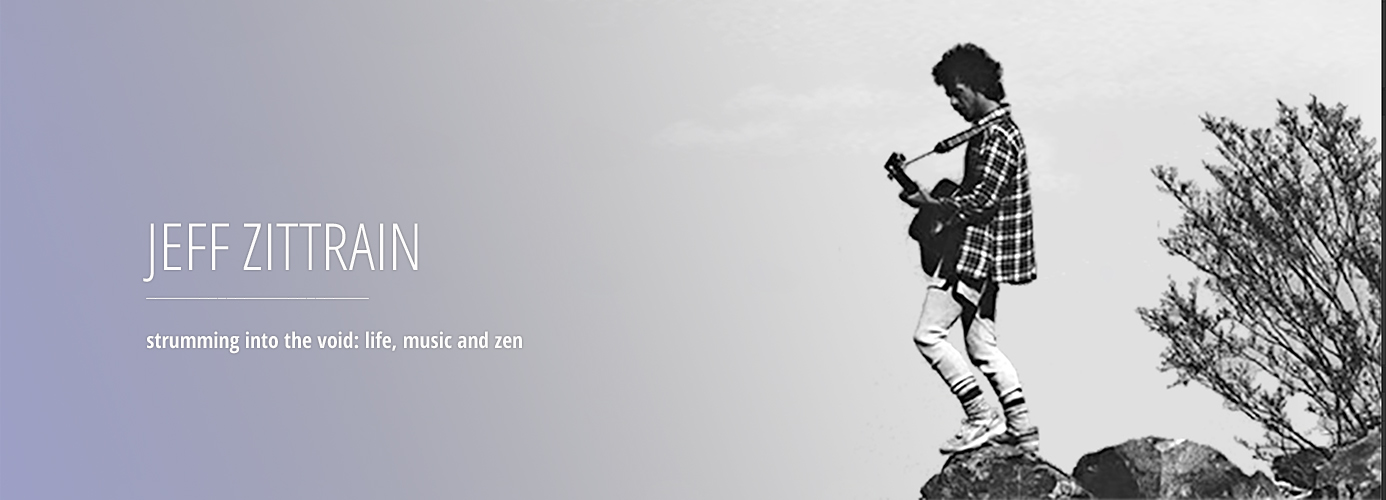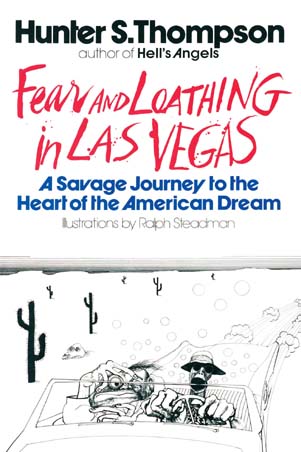
You’re reading a column that’s been months in the making, ever since I dove headfirst into the Criterion Collection edition of “Fear and Loathing in Las Vegas” – the full 1998 movie with 3 different commentary tracks and a cadillac convertible trunkload of documentary extras.
“Fear and Loathing” is prime pickin’ for this column: Hunter S. Thompson’s 1972 book on which it was based was not only crowned by the NY Times “the best book on the dope decade” but is generally acknowledged as a worthy “counter-cultural touchstone” – that is, a stone two succeeding generations have found worthy of touching (and dropping, smoking, drinking and otherwise ingesting) up to the present.
The whole phenomenon contains leaps and bounds of interpretation – between the movie and the book, between the book and the real life characters on whom it was based – and between Thompson’s philosophy and the too-often dumbed-down misconceptions of his work.
I jotted down many a note for a few weeks, but the nuts and bolts nose-to-the-grindstone actual writing was not reaching takeoff speed. I then noticed Thompson’s widow was reading from her new book “The Gonzo Way” in Berkeley – so I went to the reading, told her about my column, bought and read her book – but the damn column wouldn’t write itself.
Then in a weird flash of synchronicity, the universe literally kicked my butt into gear:
1. I received from Amazon.com a copy of “Kick Me,” an autobiographical account of painful (and hilarious) adolescence by Paul Feig, who in a sane world would be an enshrined household name for creating the greatest TV show about high-school ever, the criminally short-lived (set in 1980, it ran for one season in 2000) “Freaks and Geeks.”
2. That same day, my iPod shuffle brought up Pete Townshend’s “However Much I Booze,” arguably the most confessional song on the most confessional album of rock’s most confessional band, 1975’s “The Who By Numbers.”
3. And in the coup de grace later that night I unpacked a box and found the first two books I had to read for my very first English class in college, Montaigne’s “Essays” from 1580 (with the stated goal to describe himself “with utter frankness”) and Rousseau’s “Confessions.”
Here of course, literally sitting in my hands and staring me in the face and saying “kick me” was the new column – the level of truth in autobiography, the value of brutal honesty, the attempt to reveal oneself through art.
And the fact that it’s always misconstrued.
“The Gonzo Way” is in fact Anita Thompson’s explicitly stated attempt to correct the public’s misconception of her late husband’s life and work. She takes great pains to assert its positive lessons rather than its popular notion as some kind of mindless frat-boy partying.
This notion is unfortunately not helped a whole lot by the film version of “Fear and Loathing.” Although lead actor Johnny Depp’s commentary claims the film is “not a wild romp about getting wasted” and Director Terry Gilliam calls the book “a spiritual journey” – explaining that Las Vegas is Hell and represents the epitome of the American Dream (it’s a place “all about winning and losing but with no meaning other than money”) – they doth protest too much.
Because Gilliam’s film generally ignores the deeper points. As I said back in my column on “Buffy the Vampire Slayer” (“Look at Yourself” Oct. ‘05), unlike that show’s pretty profound insights into altered realities, this film shows the external results of the psychedelic experience, the wrecked hotel rooms and circus-like visuals, but doesn’t really speak from the inside, from the visionary experiences that make its two questionable heroes create the seemingly insane patterns, scrawlings and chaos in their hotel rooms. Which makes sense when Gilliam also admits he’s never taken psychedelics.
It would also be clearer that Vegas is hell if Gilliam didn’t replace the one song that they play obsessively during their trip in the book – the Rolling Stones’ “Sympathy for the Devil” – with Janis Joplin’s “Combination of the Two,” effectively exchanging the hell vibe for the party vibe.
And the wrecking of the hotel rooms and the white Cadillac – does it really come off as a “protest against materialism” as Gilliam’s commentary claims – or simply irresponsible frat-boy type behavior?
That’s the more-than-million dollar question which goes beyond the film to the wider fallout from the sixties: Consider the infamous trashing of hotel rooms which was seemingly de rigueur for 70’s rock bands (and most mythologized by Led Zeppelin and the aforementioned emphatically confessional Who) – was this an extension of the anti-materialistic, pro-exuberance hippie ideals from which those bands were born – or more mindless irresponsibility?
Thompson confronts this issue in a powerful speech at the end of the film wherein he asserts the “great lie” of the sixties generation as “the desperate assumption that somebody or some force is tending the light at the end of the tunnel.”
Thompson’s existential perspective – that no one is tending that light – can lead, it seems to me, in two opposing directions: nihilism or greater personal responsibility. As long as we’re talking autobiographical art, I’ve always found the second path masterfully summed up at the end of Woody Allen’s semi-confessional “Crimes and Misdemeanors” when his alter-ego Cliff declares: “in the absence of god, man must step up and take responsibility himself.”
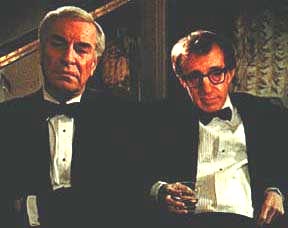
Thompson also claims this option in his commentary track, but “Fear and Loathing” itself, however, at least flirts with nihilism. It’s hard to interpret self-responsibility in the famous epigraph of the book, which also begins the film: “He who makes a beast of himself gets rid of the pain of being a man.”
(This quote can quickly flash us back for a moment to our friends the Who, famous not just for wrecking hotel rooms but also their own instruments on stage in a frenzy of “auto-destructive art” – prompting a newspaper to run a picture of a young Pete Townshend smashing his guitar into an amp under the headline “A Beast Invades the High School Hop” – a perfect image of the way the 60’s demolished the 50’s.)
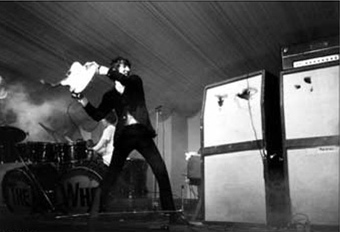
Benicio del Toro’s menacing portrayal of Thompson’s cohort and attorney is certainly beast-like, with only the slightest of nods to his real-life counterpart Oscar Zeta Acosta’s socio-political motivations. The entire movie is in fact stripped of the book’s political context so when the drugs make our heroes into beasts, we don’t see that, as Depp puts it, “ they were at war, and drugs were their armor.”
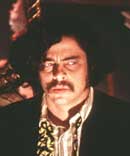
Depp’s take is interesting, because at first glance the drugs don’t seem to protect them as much as put them in intensely vulnerable positions – paranoid, panicked – full of, um, fear and loathing.
To which Thompson’s mantra is “get a grip, maintain.” And that’s where the insulation happens. Because paradoxically, somehow, it all becomes fun. Life, even life packed with fear and loathing, becomes a game, an adventure.
I remember seeing a “Calvin and Hobbes” t-shirt at a Grateful Dead show depicting Calvin as Spaceman Spiff tearing through the universe and thinking how well that captured the psychedelic experience – Calvin’s childhood imagination as assertion of the wondrous adventure of life as well as rebellion against the dull adult world.
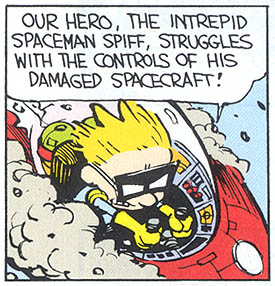
“If this ain’t the real thing, it’s close enough to pretend” again asserts the power of the imagination in the Dead’s “Saint of Circumstance” which I also saw emblazoned on a Dead t-shirt, with an accompanying picture of Calvin gesturing towards his lifeless stuffed tiger Hobbes while looking up at his arms-folded parents…
But the adult world outside of the comic strip isn’t just dull – it’s evil, too. And while Thompson confronts the belly of the beast, head-on, in hell, it stretches its ugly claws far beyond Vegas.
If Thompson were truly choosing nihilism, he wouldn’t feel such moral outrage at the state of America, embodied in his revulsion for his arch-nemesis Richard Nixon. The film does allude to that (without any explanation) in a scene where multiple images of Nixon are coming at Thompson from a barrage of tv’s he’s piled up in their hotel room, like a mechanical hydra with bad hair and a sweaty upper lip. It’s hell on earth, not from drugs, but the actual political reality of the time…
And watching this in 2007, I couldn’t help but wonder – are we still fighting the same war that Depp was referring to? As bad as Nixon was, what hell is being created by the present administration…? Did someone mention irresponsible frat-boy behavior…?
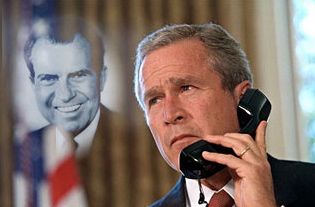
Get a grip, maintain…
Since this essay is centered on autobiography, I’ll disclose here that I myself once bought a Dead shirt with yet another Calvin and Hobbes allusion – and weirdly, yet another quote from “Saint of Circumstance” – this one reading “Sure don’t know what I’m going for, but I’m gonna go for it for sure” featuring Calvin and Hobbes tearing down a hill in their little wagon…
Which fits the credo I needed at the time – in the inner war we all seem to fight, the dark night of the soul staring into uncertainty and the void – instead of succumbing to inaction and despair – full speed ahead. Even though the wagon’s wheels are spinning wildly, looking like they might come off, we can soldier on, the way Thompson staggers through his adventures in Vegas.
However, Hobbes looks decidedly less determined than Calvin, bouncing up out of the back of the wagon like he’s just along for a ride he’s not sure is a great idea…
But Hobbes is a part of Calvin. Calvin’s personification and friendship with Hobbes is – one quick tiger leap, here – attaching himself to his inner beast, getting rid of the pain of being a… 6-year old. It’s a pain that in some ways never stops – that’s why Paul Feig recounting his awkward childhood foibles in 2002’s “Kick Me” fulfills Montaigne’s 1580 mission to describe man “with utter frankness.”
“However much I booze, there ain’t no way out” Townshend lamented back on my iPod – but the music soars like Calvin’s wagon – it lifts you up.
“We get hung over but we always survive it” Townshend would proclaim a few years later in “New Song.” Like Thompson, he could sure milk those substance abuse metaphors, riding Blake’s road of excess to at least an overnight motel palace of wisdom. But I don’t know if he could write that in 2007, with half of the Who prematurely dead, as well as Hunter Thompson.
In fact, in 2007, as we face the foul fruits of another disastrous U.S. regime in power and humanity, perhaps more than ever, teetering on the brink of destruction, it seems we really need to accept that no one is going to tend that light for us – rather, “the future’s here, we are it, we are on our own.” (Hey, it’s a Dead quote NOT from “Saint of Circumstance”!)
Which presents us again with those two paths – despair that no one’s watching after us – or excitement at the freedom in watching after ourselves.
And if I had to put that Dead quote on a Calvin and Hobbes t-shirt, I’d use the final strip in which the two zoom off on a sled through newly fallen snow while Calvin proclaims “It’s a magical world, Hobbes ol’ buddy…Let’s go exploring!”

Or I’d use it as the epigraph to the final episode of “Freaks and Geeks” for the way in which Paul Feig sends his main character, Lindsay Weir (you can decide if that’s a reference to the Dead’s rhythm guitarist/vocalist…), off into the sunset – she abandons her pre-college summer academic workshop in 1980 to…become a deadhead.

Becoming a deadhead – now there’s a cultural touchstone with a message that seems to have miraculously survived, at least in this momentary manifestation, its many mainstream misconceptions.
I watched that episode with my niece this summer and she got it – a college sophomore in 2007 digging a show made in 2000 about joining a band in 1980 that was born in the mystic acid revelations of the 1960’s (and here I’m writing about it in the stream-of-thought essay style conceived by Montaigne in 1580 (which later alchemized into Thompson’s “Gonzo Journalism” in the 70’s) – okay, that last part’s a stretch, but how could I not squeeze good ol’ Montaigne in…) – now where was I? oh yeah, despite its myriad moronic misappropriations, becoming a deadhead can be a ride with universal relevance, affirmation in the face of the void.


“Buy the ticket, take the ride” Thompson famously proclaimed. No despair, no nihilism, just hang on. And sometimes that’s the rightest action that we can take…
And in the spirit of pull-no-punches Gonzo journalism I’ll add this:
It certainly beats irresponsible frat-boys, addicted to cocaine or oil, muddling through college or hell-bent on apocalypse from the helm of the world’s increasingly creaky superpower. Now there’s someone who needs to confess.
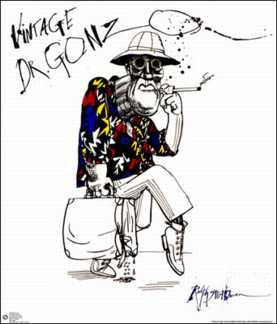
Jeff Zittrain is currently performing solo acoustic and with the Z-Trane Electric Band andFlaming Telepaths (check out his Facebook page). He was the primary songwriter, lead guitarist and co-vocalist of the rocking yet sensitive trio Famous Last Words. He is also an activist and Humanities Professor in Berkeley, CA.
6 RESPONSES TO “ FEAR AND LOATHING IN FREAKS AND GEEKS, CALVIN AND HOBBES, AND ON THE CAMPAIGN TRAIL ‘07 ”
- # 1 Jeff Says: October 14th, 2007 at 7:29 pm
- I am just testing the comment-leaving technology here, because there were a few comments on this column and the previous one that have since disappeared in the last week…hopefully this one will work – although it’s not really much of a comment – more of a meta-comment…
- # 2 Dave TerpenySays: October 30th, 2007 at 10:11 am
- With all my deep thoughts to leave I sure hope the technology works. That and I’m responsible for making it work. Doh! No one watching over me but the readers I suppose.
- Either way, right on re: Bush. But more importantly…
- “Which of you to gain me, tell will risk uncertain pains of Hell? I will not forgive you if you will not take the chance”
- Isn’t that (and not the hokey pokey) really what it’s all about?
- # 3 Sal Says: October 30th, 2007 at 10:41 am
- There’s an interesting irony in the missing comments I think. They wouldn’t publish you if no one is reading, right? But if there are no comments, how do you know you’re not just spewing forth nonsense into the void? And if so, do you continue?
- I guess that makes me a voice from the great beyond.
- # 4 SandyMan Says: November 1st, 2007 at 9:29 pm
- Thompson sez the “great lie” of the sixties generation was “the desperate assumption that somebody or some force is tending the light at the end of the tunnel.”
- Him and the hippies were wrong. We’ve always been the “somebody” tending the light at the end of the tunnel. They wanted to see some mystical force behind and he couldn’t understand the good in people to do it themselves.
- Be the fuckin’ change you want to see. So to speak.
- # 5 Jeff Says: November 2nd, 2007 at 1:02 pm
- So the comments are working – yay – proof positive that I’m not spewing nonsense into the void – it may be going somewhere else but at least it’s not cluttering up the void…
- thanks for the thoughtful observations – In terms of us being the “somebody” tending the light at the end of the tunnel, I recall a revelation in “The Electric Kool-Aid Acid Test” somewhere along the lines of “nobody here but us pranksters…”
- # 6 Joe (and nothing else) Says: November 2nd, 2007 at 10:17 pm
- More like Jeff is working and spewing nonsense into the void. Where have you been my philosophical friend? Hanging on somewhere I imagine.
- This leaves me wondering that if, by hanging on, we don’t inherently create the light? The act of existential desperation gives that spark and the thousands of such acts by the thinking spiritual segment of population create…oh shit…a thousand sparks that make the light?
- That really means that there’s “nobody here but us pranksters” keeping it lit. Which, by the way, should be the title of your next column.
